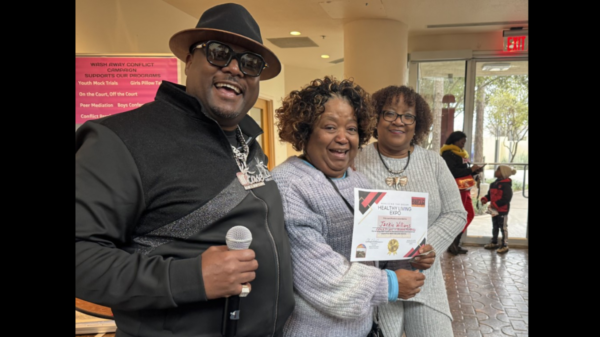By Eva D. Coleman
Lifestyle & Culture Editor
Imani Othello is a boss. Played by award-winning actress Denise Lee, she dominates the stage in breaking barriers, serving in an often untapped role reversal and love.
The Tragedy of Othello, written by Bishop Arts Theatre’s Dallas-based and Latino playwright-in-residence Franky D. Gonzalez, is a tale that brings all of the isms to the surface as his main character, a Black woman, becomes head coach of a professional football team. The twists and turns of trust, insecurity, bigotry and betrayal are cleverly stitched into an athletic dream that falls fast.
What Imani Othello faces as a head coach is indicative of treatment that lends itself to historical and current times, however the in-your-face words delivered cut deep, eliciting a shocked response from the audience. The jarring moments were intentional.
“For me, one of the things that I have learned in being a playwright of color is that oftentimes, the ignorance of other people is not malicious, it is just ignorance,” Gonzalez said. “But when they see our struggles and they see the humanity of the weight that we bear, they begin to realize, ‘Wait a sec, maybe the system is kind of screwed up.’”
It’s no secret that women of color in positions of power, especially in roles dominated by men, have a tough time. Gonzalez’ Tragedy of Othello is an expression of deep sentiment for his upbringing by his single mom, Bishop Arts Theatre Centre’s longtime artistic director of over 30 years, Teresa Coleman Wash, and the super and well-regarded performance talent of Lee.
“This is very much a love letter to the women that I’ve been around, especially Teresa and Denise, all of the things that they have gone through, and they’ve witnessed,” Gonzalez said. “It’s a testament to them and a tribute to them that I hope measures up to their greatness.”



Lee admitted that she had to learn some things about football, such as “QBR” or “quarterback rating” in her portrayal of Imani. She delivered from the female lens convincingly and definitely owned more than the stage.
“Every decision Imani makes, she made it,” Lee said. “They were her choices. She owned them.”
Lee was pleased with being given the artistic license to not fit into a box.
“Franky wrote a character where I did not come in and tell Othello’s story,” Lee said. “I told the scenario based on a woman’s point of view so it literally is her story; not me coming in and assimilating into Othello and handling it the way a man would handle it.”
The Tragedy of Othello has moments that are ugly and crude, more realistic of aspects of the world we live in.
“One of the things I loved about this role is, we’ve gotten into the habit as we tell our stories now that they all have to end in a nice, little tidy bow…all of our stories don’t end that way,” Lee said.
Just as a clock winds down in a football game, there’s a build up to emotional drain and suspense, leaving the audience wondering about the final outcome of Imani’s test.
“By allowing this to play out as it does, it can help women to see, ‘I have to be more secure in who I am,’” Lee said.
The Tragedy of Othello ends as it traditionally does…in tragedy, however there’s triumph in how liberating it is for discovery of self worth.
“We get to see, in the same mode as the Shakespearean heroes, the Grecian heroes, the Greek heroes, a triumphant rise and a spectacular phoenix-like fall and collapse into flames; that it is always passionate, that it is always burning and until the very end, ownership is all that is being sought after, and she [Imani] takes it,” Gonzalez said.
“To me, the triumph is to see a woman who owns everything to the very bitter end.”
The Tragedy of Othello runs through November 5. Tickets can be purchased online at www.bishopartstheatre.org or by calling the box office at 214-948-0716.









You must be logged in to post a comment Login